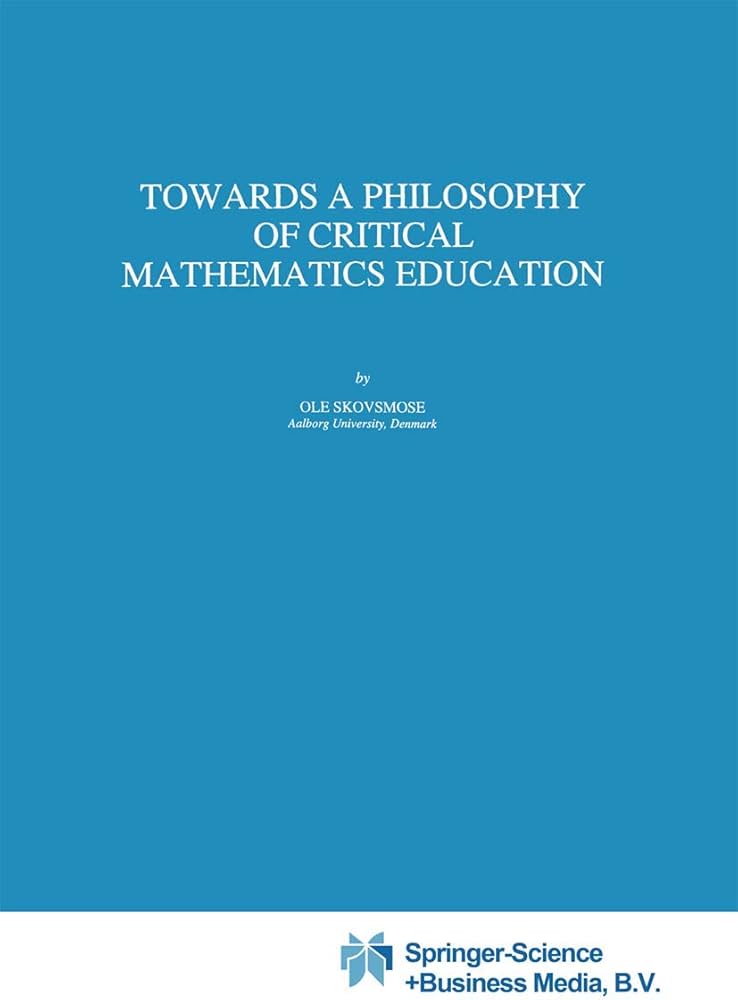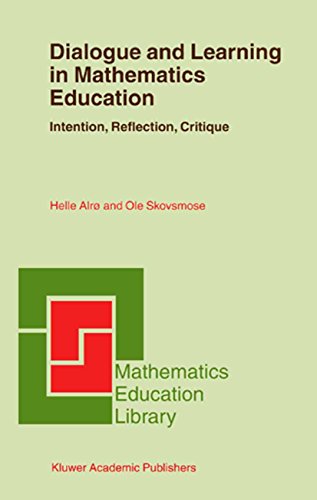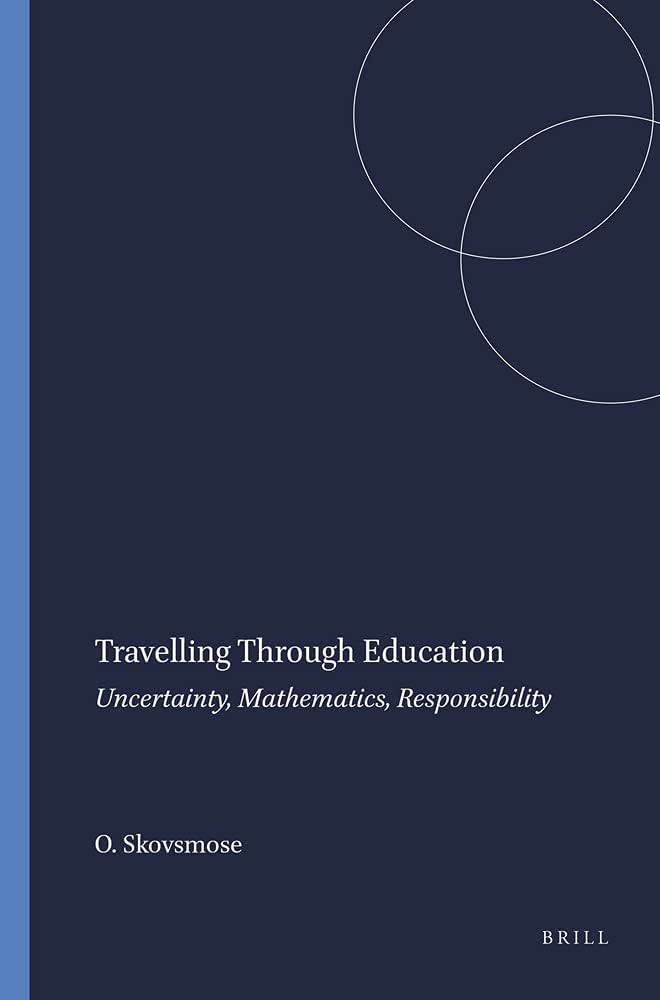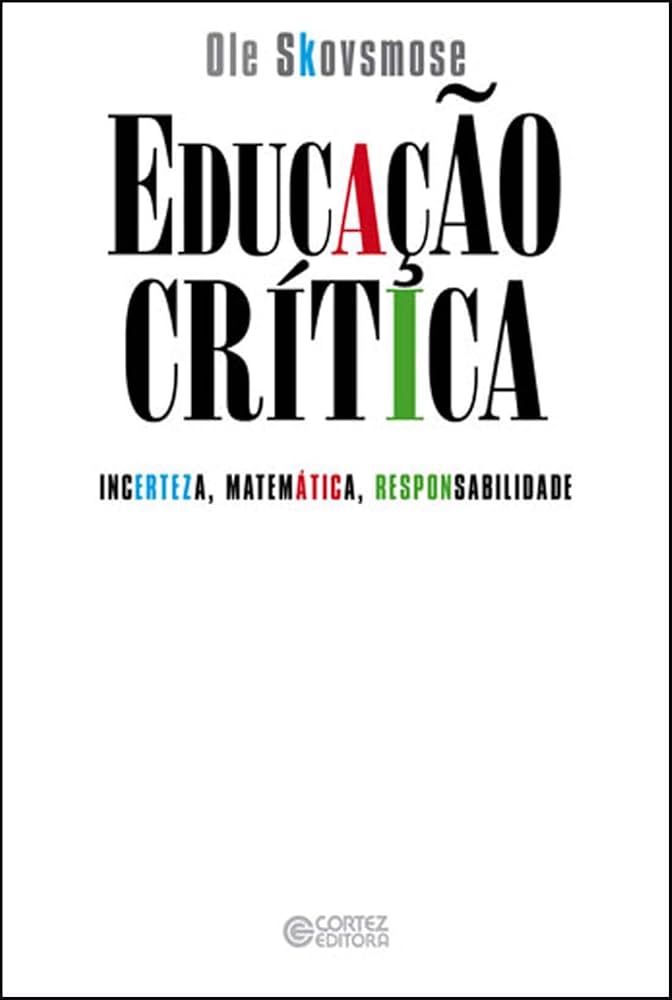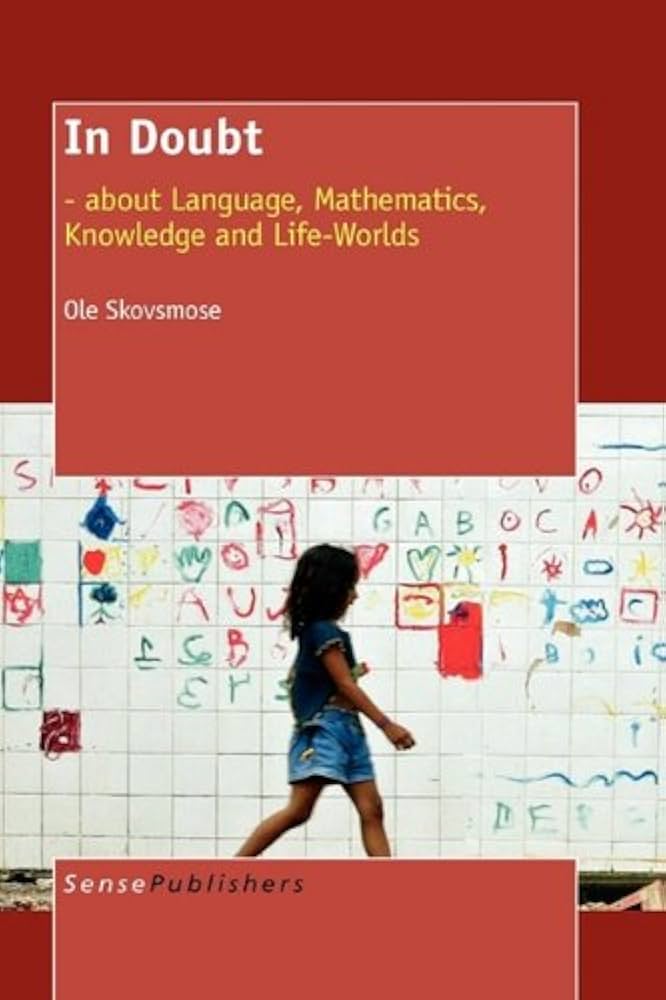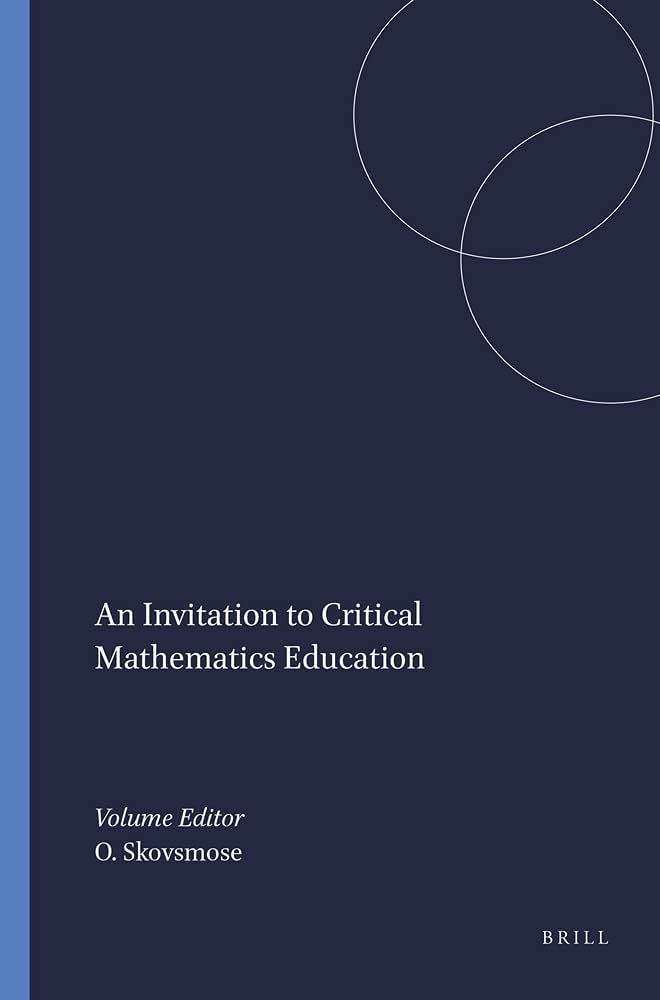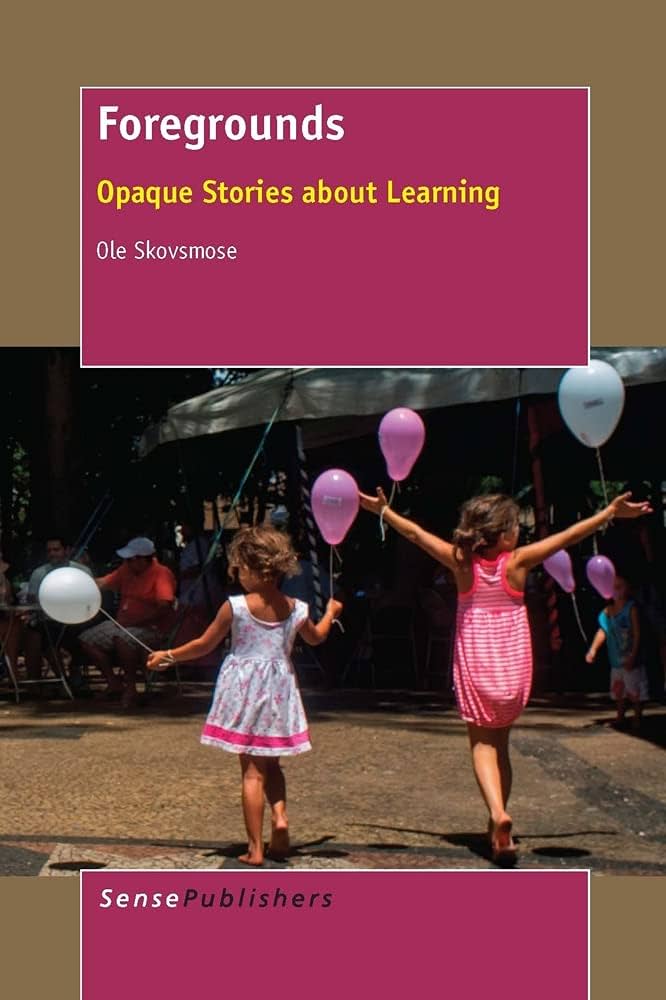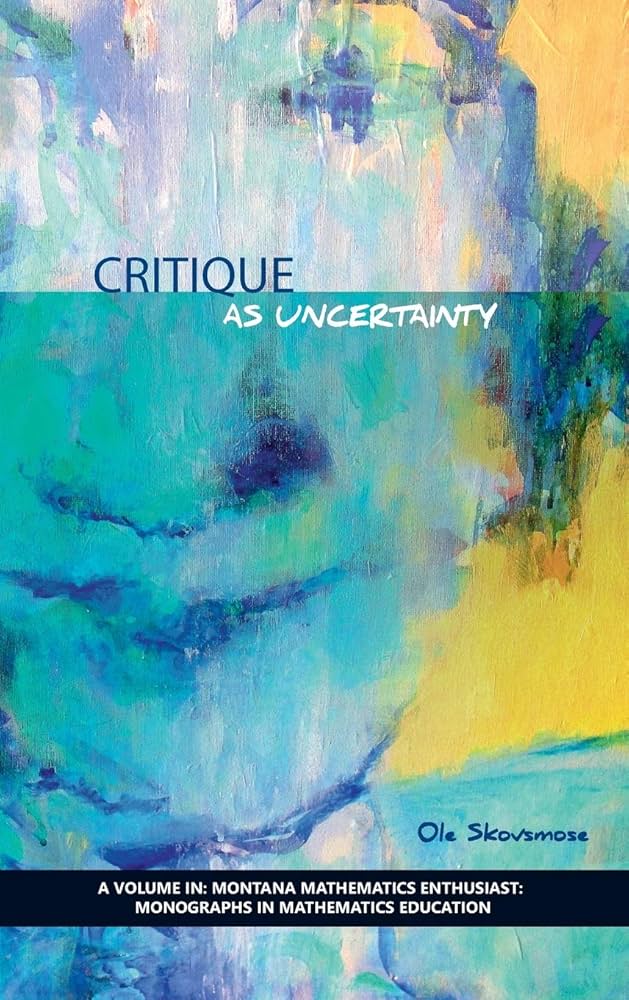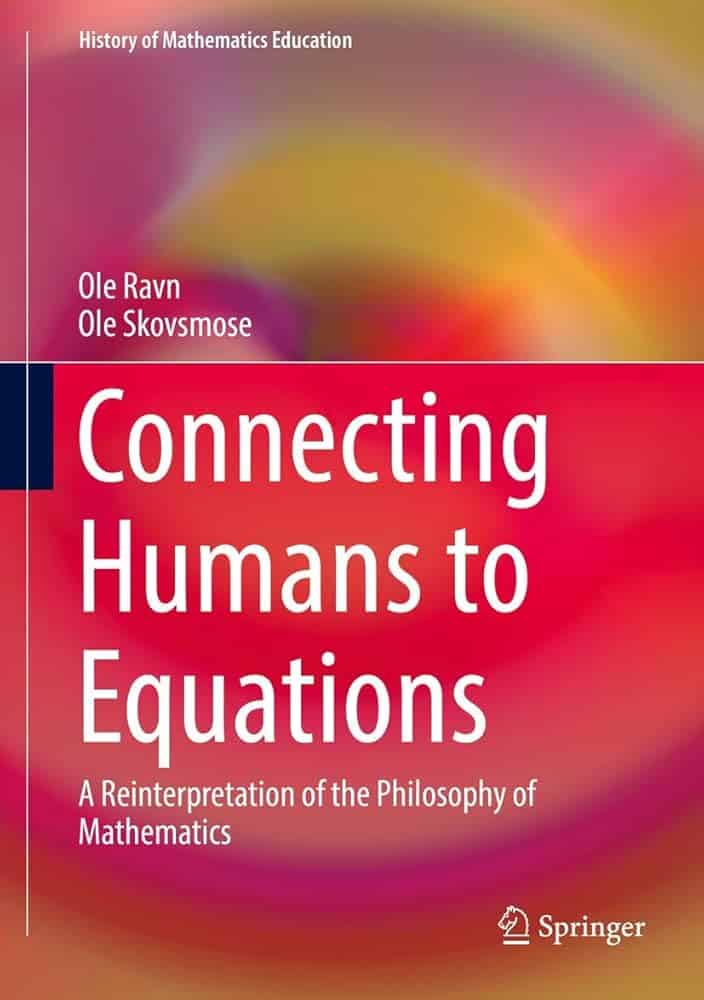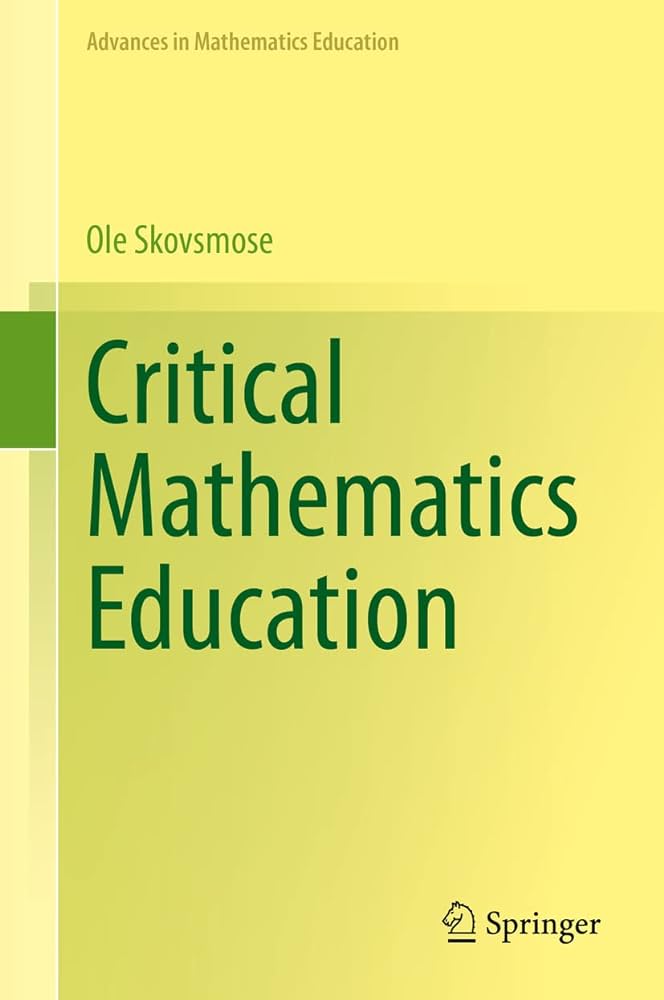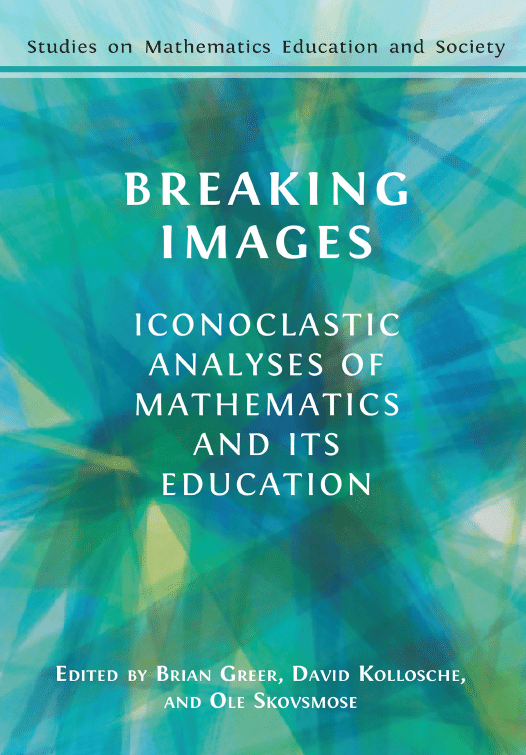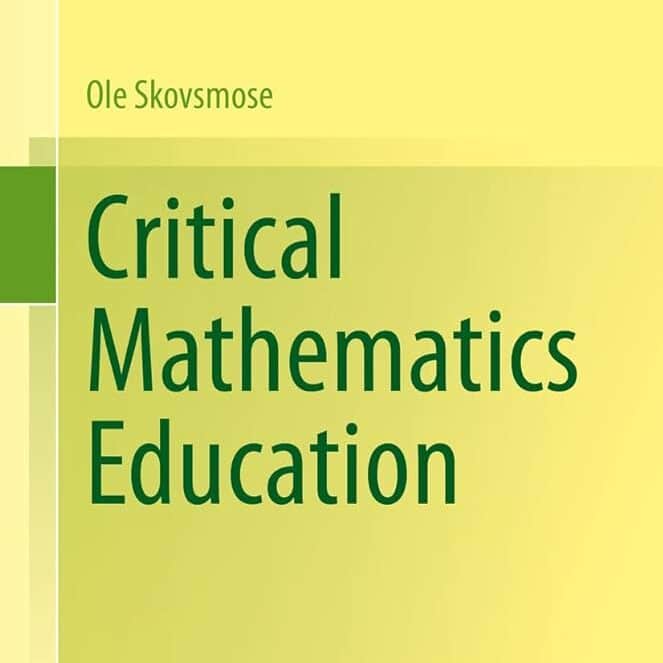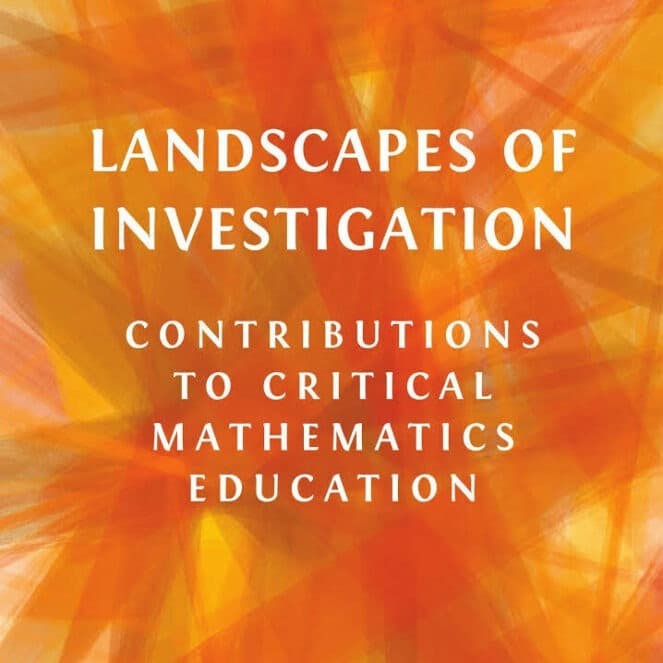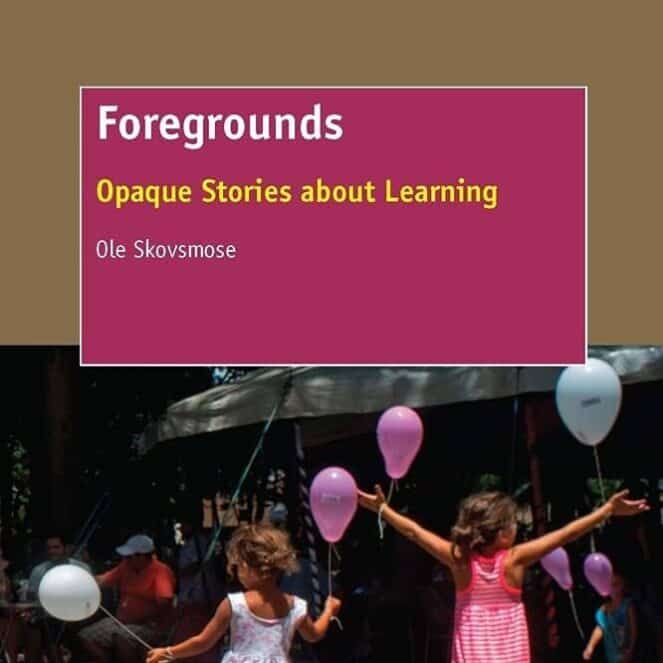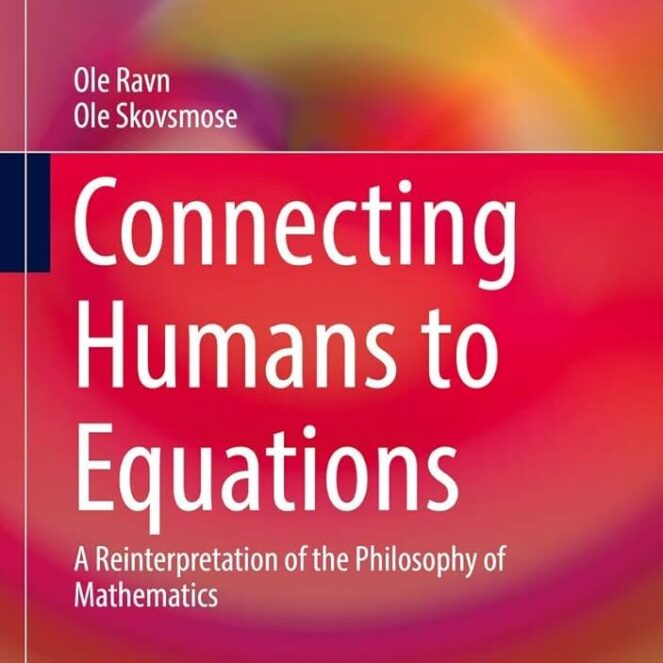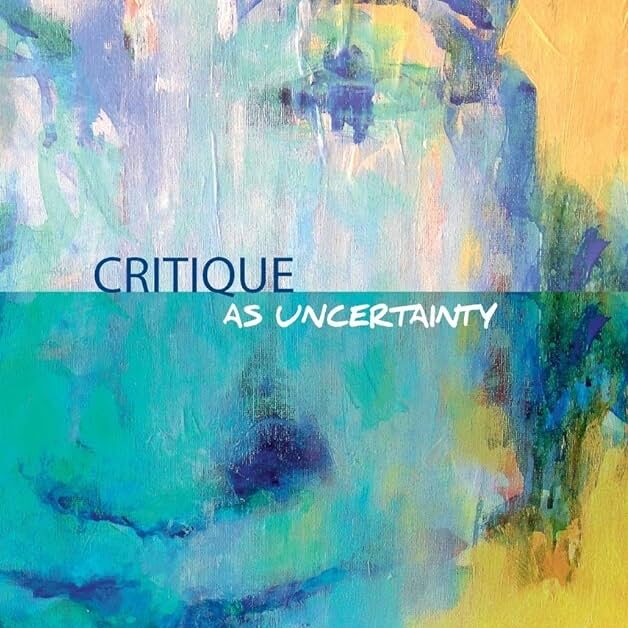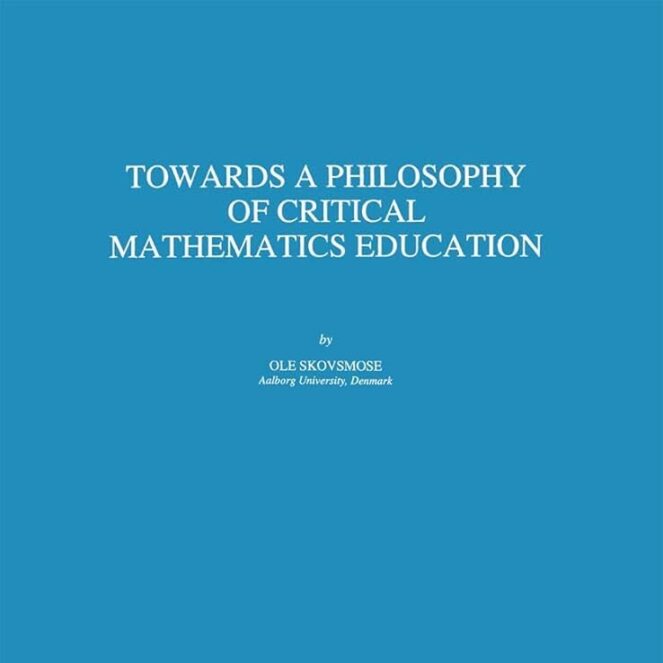Academic Career
1968
The students’ movement associated to 1968, the year I started at Copenhagen University, brought about many new ideas in education. I was inspired by this movement, but also by much literature published in German.
1977
In 1977 I got a PhD scholarship…
1982
…and in 1982 I got the PhD degree for my work in critical mathematics education. Initially my work had first of all Denmark as reference, and my publications was in Danish.
1982
I got a position at Aalborg University. Here one of my colleagues suggested that I should try publish something in English. I liked the idea and wrote an article in English which got positive reactions.
1990
I decided to continue, and one of the results became the book Towards a Philosophy of Critical Mathematics Education. From 1990 to 1991 I drafted the book while visiting the University of Cambridge.
1994
Then it took me three more years to revise and improve the manuscript before it finally got published in 1994. In the same year, I visited the Brazil for the first time.
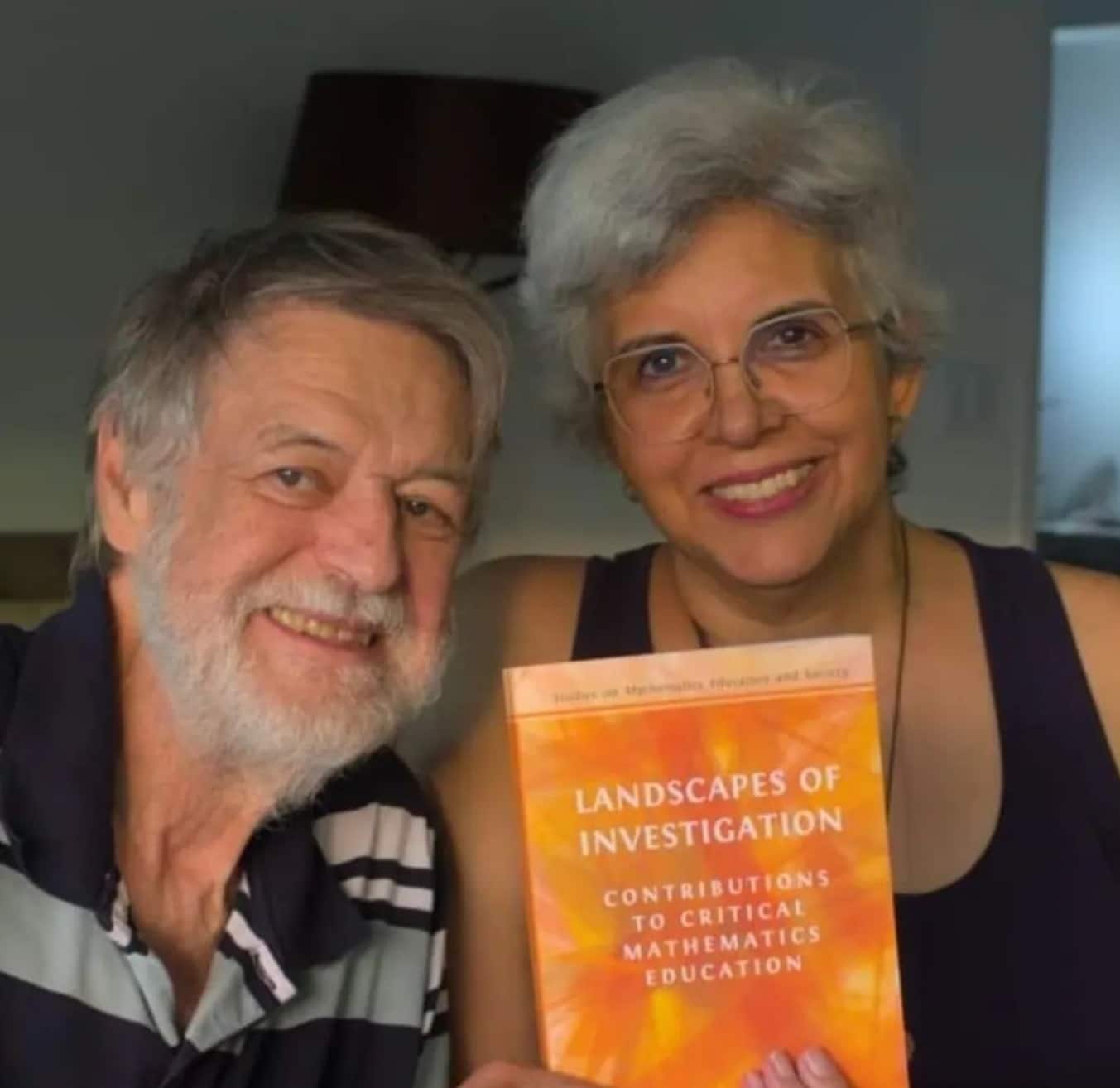

Partly due to Towards a Philosophy of Critical Mathematics Education I was invited to become supervisor of a group of black and Indian PhD students in South Africa. They belonged to the first generation of PhD students graduating after the apartheid regime had come to an end. As supervisor I learned a lot, and I came to see critical mathematics education is a much broader perspective.
In 1994 I visited Brazil for the first time. I found the Brazilian context to be very different from the Danish, but also different from the South African. This inspired me to develop new dimensions of critical mathematics education. For 15 years, I have been supervising PhD students at Universidade Estadual Paulista – Unesp in Brazil. Here Miriam and I are the leaders of Épura Research Group. This is a continuous inspiration for me.
I have published many books:
About
Research Projects
Critical mathematics education
In Towards a Philosophy of Critical Mathematics Education (Skovsmose, 1994), I provided a comprehensive presentation of basic ideas of critical mathematics education. The presentation was based on my experiences from a Danish and Scandinavian context. In Travelling Through Education (Skovsmose, 2005), I established a broader perspective by also considering my experiences from the South African project,. My recent contribution to the further development of critical mathematics can be found in the book Critical Mathematics Education (Skovsmose, 2023). Here I address the notions of hope and concern, and formulate a constructive interpretation of social justice. I address phenomena like erosions of democracy, racism, and symbolic violence and show how they relates to mathematics. Here I have also formulated a dialogic theory of learning mathematics, showing the intimate relationship between dialogue and critique.
Landscapes of investigation
This notion I presented for more than 25 years ago, and it has been developed ever since. A landscape of investigation invites students and teachers to work together in explorative processes. Such a landscape forms a learning-teaching environment, different from the one dominating the school mathematics tradition. Landscapes of investigation invite for dialogic interactions, which are crucial for establishing critical activities. Many studies, both Master’s thesis and Ph.D. dissertations, have investigated examples of landscapes of investigation in different areas of mathematics and in different geographical contexts. The book Landscapes of Investigation: Contributions to Critical Mathematics Education (Penteado and Skovsmose, 2022) documents the most recent development of the notion.
Students’ foregrounds
This notion was first presented in the book Towards a Philosophy of Critical Mathematics Education (Skovsmose, 1994), and since then it has been developed considerably. An important inspiration came from my activities in South Africa. I came to recognise a new significance of the notion of students’ foregrounds for interpreting students’ achievements in mathematics (see Travelling Through Education, Skovsmose, 2005). Due to the very apartheid regime, back students’ foregrounds were devastating amputated. This annihilated possible motives for learning mathematics. Black students’ low achievements in mathematics tells first of all about the social, political, and economic oppression that they are subjected to. In Foregrounds: Opaque Stories about Learning (Skovsmose, 2014), I investigated more carefully the notion of foreground as it, for instance, can be related to the notion of life-world. In Critical Mathematics Education (Skovsmose, 2023), I explored further the connections between students’ foregrounds and motives (or lack of motives) for learning mathematics.
Inclusive mathematics education
Can be given two different interpretations: a specific one and a general one. According to the specific interpretation, inclusive mathematics education addresses how students with disabilities, like being deaf or blind, can be integrated in the regular classroom and not placed in special classrooms or special schools. A principal presentation of the specific interpretations of inclusive mathematics education is found in Inclusive Mathematics Education: State-of-the-Art Research from Brazil and Germany (Kollosche, Marcone, Knigge, Penteado and Skovsmose, 2019). I have contributed to the formation of inclusive mathematics education by elaborating the notion of “inclusive landscape for investigation”. Furthermore, I have contributed to the general interpretation of inclusive mathematics education by addressing the teaching of mathematics across national, economic, and cultural differences. The article “Inclusive Citizenship Through Mathematics Education” (Skovsmose, Moura, and Carrijo, 2003) elaborate on these ideas and presents the notion of inclusive citizenship.
Pedagogical imagination
Critical mathematics education recognises the importance of providing descriptions based on both quantitative and qualitative studies. However, it is also important to move beyond the descriptive research paradigm. It is not only vital to research “what is”, but also to research “what could be”. Otherwise research might be confined by the limitations imposed by the political status quo. This brings the notion of pedagogical imagination into the centre of research methodology. A pedagogical imagination can be based on loose speculations, but it can also be based on systematic studies. Pedagogical imagination as integral part of research methodology is discussed in the article “Research Methodology and Critical Mathematics Education” (Skovsmose and Boba, 2004) and “Researching Possibilities” (Skovsmose, 2009). The article “Pedagogical Imagination in Mathematics Teacher Education” (Skovsmose, Lima and Penteado, 2023) represents the latest development of the discussion.
Critical philosophy of mathematics
In Connecting Humans to Equations: A Reinterpretation of the Philosophy of Mathematics (Ravn and Skovsmose, 2019) we have presented a four-dimensional philosophy of mathematics. While classic approaches like logicism, formalism, and intuitionism turn two-dimensional by focusing on ontological and epistemic issues, a four-dimensional philosophy also addresses sociological and ethical issues. A four-dimensional philosophy of mathematics resonates with the outlook of critical mathematics education. I develop these ideas further as integral part of a critical philosophy of mathematics. Steps in formulating such a philosophy are presented in the articles “Banality of Mathematical Expertise” (Skovsmose, 2020), “Mathematics and Ethics” (Skovsmose, 2020), and “Mathematics and Crises (Skovsmose, 2021). Currently I am completing a book manuscript with the working title Critical Philosophy of Mathematics.
About
Research Projects
Critical mathematics education
In Towards a Philosophy of Critical Mathematics Education (Skovsmose, 1994), I provided a comprehensive presentation of basic ideas of critical mathematics education. The presentation was based on my experiences from a Danish and Scandinavian context. In Travelling Through Education (Skovsmose, 2005), I established a broader perspective by also considering my experiences from the South African project,. My recent contribution to the further development of critical mathematics can be found in the book Critical Mathematics Education (Skovsmose, 2023). Here I address the notions of hope and concern, and formulate a constructive interpretation of social justice. I address phenomena like erosions of democracy, racism, and symbolic violence and show how they relates to mathematics. Here I have also formulated a dialogic theory of learning mathematics, showing the intimate relationship between dialogue and critique.
Landscapes of investigation
This notion I presented for more than 25 years ago, and it has been developed ever since. A landscape of investigation invites students and teachers to work together in explorative processes. Such a landscape forms a learning-teaching environment, different from the one dominating the school mathematics tradition. Landscapes of investigation invite for dialogic interactions, which are crucial for establishing critical activities. Many studies, both Master’s thesis and Ph.D. dissertations, have investigated examples of landscapes of investigation in different areas of mathematics and in different geographical contexts. The book Landscapes of Investigation: Contributions to Critical Mathematics Education (Penteado and Skovsmose, 2022) documents the most recent development of the notion.
Students’ foregrounds
This notion was first presented in the book Towards a Philosophy of Critical Mathematics Education (Skovsmose, 1994), and since then it has been developed considerably. An important inspiration came from my activities in South Africa. I came to recognise a new significance of the notion of students’ foregrounds for interpreting students’ achievements in mathematics (see Travelling Through Education, Skovsmose, 2005). Due to the very apartheid regime, back students’ foregrounds were devastating amputated. This annihilated possible motives for learning mathematics. Black students’ low achievements in mathematics tells first of all about the social, political, and economic oppression that they are subjected to. In Foregrounds: Opaque Stories about Learning (Skovsmose, 2014), I investigated more carefully the notion of foreground as it, for instance, can be related to the notion of life-world. In Critical Mathematics Education (Skovsmose, 2023), I explored further the connections between students’ foregrounds and motives (or lack of motives) for learning mathematics.
Inclusive mathematics education
Can be given two different interpretations: a specific one and a general one. According to the specific interpretation, inclusive mathematics education addresses how students with disabilities, like being deaf or blind, can be integrated in the regular classroom and not placed in special classrooms or special schools. A principal presentation of the specific interpretations of inclusive mathematics education is found in Inclusive Mathematics Education: State-of-the-Art Research from Brazil and Germany (Kollosche, Marcone, Knigge, Penteado and Skovsmose, 2019). I have contributed to the formation of inclusive mathematics education by elaborating the notion of “inclusive landscape for investigation”. Furthermore, I have contributed to the general interpretation of inclusive mathematics education by addressing the teaching of mathematics across national, economic, and cultural differences. The article “Inclusive Citizenship Through Mathematics Education” (Skovsmose, Moura, and Carrijo, 2003) elaborate on these ideas and presents the notion of inclusive citizenship.
Pedagogical imagination
Critical mathematics education recognises the importance of providing descriptions based on both quantitative and qualitative studies. However, it is also important to move beyond the descriptive research paradigm. It is not only vital to research “what is”, but also to research “what could be”. Otherwise research might be confined by the limitations imposed by the political status quo. This brings the notion of pedagogical imagination into the centre of research methodology. A pedagogical imagination can be based on loose speculations, but it can also be based on systematic studies. Pedagogical imagination as integral part of research methodology is discussed in the article “Research Methodology and Critical Mathematics Education” (Skovsmose and Boba, 2004) and “Researching Possibilities” (Skovsmose, 2009). The article “Pedagogical Imagination in Mathematics Teacher Education” (Skovsmose, Lima and Penteado, 2023) represents the latest development of the discussion.
Critical philosophy of mathematics
In Connecting Humans to Equations: A Reinterpretation of the Philosophy of Mathematics (Ravn and Skovsmose, 2019) we have presented a four-dimensional philosophy of mathematics. While classic approaches like logicism, formalism, and intuitionism turn two-dimensional by focusing on ontological and epistemic issues, a four-dimensional philosophy also addresses sociological and ethical issues. A four-dimensional philosophy of mathematics resonates with the outlook of critical mathematics education. I develop these ideas further as integral part of a critical philosophy of mathematics. Steps in formulating such a philosophy are presented in the articles “Banality of Mathematical Expertise” (Skovsmose, 2020), “Mathematics and Ethics” (Skovsmose, 2020), and “Mathematics and Crises (Skovsmose, 2021). Currently I am completing a book manuscript with the working title Critical Philosophy of Mathematics.
Discover my
Publications
Publications 2020 -
Greer, B., Skovsmose, O. and Kollosche, D. (Eds.) (in progress). Breaking Images: Iconoclastic Analyses of Mathematics and its Education. Cambridge: Open Book Publishers.
Skovsmose, O. (2024). Mathematics is indefinite. In P. Ernest (Ed.), Ethics and mathematics education: The good, the bad and the ugly (pp. 13-33): Springer.
Barros, D. D. & Skovsmose, O. (2024) LGBT+ life conditions: A landscape of investigation in mathematics education. Submitted for a special issue on Journal of Mathematics Teacher Education.
Skovsmose, O., Lima, P. & Penteado, M. G. (2023). Pedagogical imagination in mathematics teacher education. Education Sciences, 13, 1059.
Skovsmose, O. (2023). A performative interpretation of mathematics. In Bicudo, M. Bronislaw, C., A., Rosa, M. & Marciniak, M. (Eds.), Ongoing advancements in philosophy of mathematics education (pp. 269-292). Chaim: Springer.
Skovsmose, O. Moura, A. & Carrijo, M. (2003). Inclusive citizenship through mathematics education. ZDM – Mathematics Education.
Skovsmose, O. (2023). Critical mathematics education. Springer.
Skovsmose, O. (2022). Dialogue, landscapes, and critique. In N. S. Kennedy & E. Marsal (Eds.), Dialogical inquiry in mathematics teaching and learning: A philosophical approach (pp. 11-25). LIT Verlag.
Penteado, M. G. & Skovsmose, O. (Eds.) (2022). Landscapes of investigation: Contributions to critical mathematics education. Open Book Publishers.
Skovsmose, O. (2022). Concerns of Critical Mathematics Education – and of Ethnomathematics. Revista Colombiana de Educación, (86), 361-378.
Alrø, H. & Skovsmose, O. (2021). Diálogo e prendizagem em Educação Matemática. 3ª Edição. Tradução Orlando de Andrade Figueiredo. Autêntica.
Skovsmose, O. (2021). A philosophy of critical mathematics education. Philosophy of Mathematics Education Journal, (37).
Skovsmose (2021). Mathematics and crises. Educational Studies in Mathematics, 108(1-2), 369-383.
Skovsmose, O. (2020). Mathematics and ethics. Qualitative Research Journal, 8(18), 479-503. Special Edition: Philosophy of Mathematics. Reprinted in Philosophy of Mathematics Education Journal, (36)
Skovsmose, O. (2020). What could critical mathematics education mean for different groups of students? Rethinking Critical Pedagogy. 1(1), 1-16.
Skovsmose, O. (2020). Banality of mathematical expertise. ZDM Mathematics Education, 52(6), 1187-1197.
Skovsmose, O. (2020). Mathematization as social process. In S. Lerman (Ed.), Encyclopedia of Mathematics Education Springer.
Skovsmose, O. (2020). Dialogic teaching and learning in mathematics education. In S. Lerman (Ed.), Encyclopedia of Mathematics Education. Springer.
Skovsmose, O. (2020). Critical mathematics education. In S. Lerman (Ed.), Encyclopedia of Mathematics Education. Second. Edition. Springer.
Skovsmose, O. (2020). Three narratives about mathematics education. For the Learning of Mathematics. 40(1), 47-51.
Faustino, A. C. and Skovsmose, O. (2020). Dialogic and non-dialogic acts in learning mathematics. For the Learning of Mathematics, 40(1), 9-14.
Publications 2010 - 2019
Skovsmose, O. (2019). Inclusões, encontros e cenários.. Educação Matemática em Revista, Brasília, 24(6), 16-32.
Skovsmose, O. (2019). Crisis, critique and mathematics. Philosophy of Mathematics Education Journal, (35).
Skovsmose, O. and Ravn, O. (2019). Game on for modernity? Educating Ph.D. students beyond a modern conception of science. In K. Otrel-Cass Ed.), Hyperconnectivity and digital reality: Towards the eutopia of being human (pp. 103-121). Springer.
Silva, G. H. G. & Skovsmose, O. (2019). Affirmative actions in terms of special rights: Confronting structural violence in Brazilian higher education. Power and Education. https://doi.org/10.1177/1757743819837682
Kollosche, D., Marcone, R., Knigge, M., Penteado, M. G., & Skovsmose, O. (Eds.) (2019). Inclusive mathematics education: State-of-the-art research from Brazil and Germany. Springer.
Kollosche, D., Marcone, R., Knigge, M., Penteado, M. G., & Skovsmose, O. (2019). Inclusive mathematics education: An introduction. In D. Kollosche, R. Marcone, M. Knigge, M. G. Penteado, & O. Skovsmose. (Eds.), Inclusive mathematics education: State-of-the-art research from Brazil and Germany (pp. 3-6). Springer.
Faustino, A. C., Moura, A. Q., Silva, G. H. G., Muzinatti, J. L., & Skovsmose, O. (2019). Microexclusion in inclusive mathematics education. In D. Kollosche, R. Marcone, M. Knigge, M. G. Penteado, & O. Skovsmose. (Eds.), Inclusive mathematics education: State-of-the-art research from Brazil and Germany (pp. 55-70). Springer.
Skovsmose, O. (2019). Inclusions, meetings and landscapes. In D. Kollosche, R. Marcone, M. Knigge, M. G. Penteado, & O. Skovsmose. (Eds.), Inclusive mathematics education: State-of-the-art research from Brazil and Germany (pp. 71-84). Springer.
Ravn, O and Skovsmose, O. (2019). Connecting humans to equations: A reinterpretation of the philosophy of mathematics. Springer.
Skovsmose, O. (2018). Interpretações de significado em educação matemática. Bolema: Boletim de Educação Matemática, 32(62), 764-780.
Faustino, A. C., Moura, A. Q., Silva, G. H. G., Muzinatti, J. L. and Skovsmose, O. (2018). Macroinclusão e microexclusão no contexto educacional. Revista Eletrônica de Educação, 12(3), 898-911.
Skovsmose, O. (2018). Students’ foregrounds and politics of meaning in mathematics education. In P. Ernest (Ed.), The philosophy of mathematics education today (pp. 115-130): Springer.
Skovsmose, O. (2018). Critical constructivism: Interpreting mathematics education for social justice. For the Learning of Mathematics, 38(1), 38-44.
Skovsmose, O. (2017). O que poderia significar a educação matemática crítica para diferentes grupos de estudantes? Revista Paranaense de Educação Matemática, 6(12), 18-37.
Penteado, M and Skovsmose, O. (2017). Forewords. In M. Penteado and O. Skovsmose, (Guest eds.), Special Issue: Inclusion and mathematics teaching (p. 4), Mathematics Teaching, Issue 258.
Penteado, M and Skovsmose, O. (Guest Eds.) (2017). Special Issue: Inclusion and mathematics teaching. Mathematics Teaching, Issue 258.
Faustino, A. C., Moura, A. Q., Silva, G. H. G., Muzinatti, J. L. and Skovsmose, O. (2017). Macroinclusion and microexclusion in mathematics education. In A. Chronaki (ed.). Mathematics education in the life and times of crisis: Proceedings of the Ninth International Mathematics Education and Society Conference (pp. 471-479). Volos, Greece: Mathematics Education and Society MES9.
Skovsmose, O. (2016). Meaning in mathematics education: A political issue. Revemat: Revista Eletrônica de Educação Matemática, 11,
Figueiras, L., Healy, L. and Skovsmose, O. (2016). Difference, inclusion, and mathematics education: Launching a research agenda. International Journal of Studies in Mathematics Education. 9(3) 15-35.
Skovsmose, O. (2016). Pesquisando o que não é, mas poderia ser. In D’Ambrósio, B. S.;Lopes, C. E., (eds.), Vertentes da subversão na produção científica em educação matemática (pp. 63-90). Mercado das Letras.
Skovsmose, O. (2016). Um convite à educação matemática crítica. Papirus.
Skovsmose, O. (2016). Politics of meaning in mathematics education. Philosophy of Mathematics Education Journal (31).
Skovsmose, O. (2016). Critical mathematics education: Concerns, notions, and future. In Ernest, P.; Skovsmose, O.; Bendegem, J.-P.; Bicudo. M.; Miarka, R. ;Kvasz, L.; Möller, R. (eds), The Philosophy of Mathematics Education: ICME-13 Topical Surveys (pp. 9-13). Springer.
Ernest, P.; Skovsmose, O.; Bendegem J.-P.;Bicudo, M.; Miarka, R.; Kvasz, L.; Möller, R. (eds.). The Philosophy of Mathematics Education: ICME-13 Topical Surveys. Springer, 2016.
Yasukawa, K; Skovsmose, O; Ravn, O. (2016). Scripting the World in Mathematics and its Ethical Implications. In P. Ernest; B. Sriraman; N. Ernest (eds.), Critical Mathematics Education: Theory, Praxis, and Reality (81-98). Information Age Publishing.
Skovsmose, O. (2016), Mathematics: A Critical Rationality? In P. Ernest; B. Sriraman; N. Ernest (eds.), Critical Mathematics Education: Theory, Praxis, and Reality (1-22), Information Age Publishing.
Skovsmose, O. (2016). Fjorten bemærkninger om matematiklæring som handling. In T. E. Rangers and H. Alrø (Eds.), Matematikklæring for framtida: Festskrift til Marit Johnsen-Høines (23-33). Caspar Forlag.
Skovsmose, O. (2016). What could critical mathematics education mean for different groups of students? For the Learning of Mathematics. 36(1), 2-7.
Skovsmose, O. and Penteado, M. G. (2016). Mathematics education and democracy: An open landscape of tensions, uncertainties, and challenges. In L. D. English and D. Kirshner (Eds.), Handbook of International Research in Mathematics Education (359-373). Third Edition. Routledge.
Skovsmose, O. (2016). An intentionality-interpretation of meaning in mathematics education. Educational Studies in Mathematics, 92(3). 411-424.
Skovsmose, O. (2015). Uncertainty, pedagogical imagination, explorative reasoning, social justice, and critique. In S. Mukhopadhyay and B. Greer (Eds.). Proceedings of the Eighty International Mathematics Education and Society Conference, Volume I (111-124). Portland State University.
Penteado, M. G. and Skovsmose, O. (2015): Mathemacy in a mathematized and demathematized world. In B. S. D’Ambrosio and C. E. Lopes (Eds.), Creative insubordination in Brazilian mathematics education research (107-117). Lulu Press.
Skovsmose, O. (2015). (Ethno)mathematics as discourse. In C. Bergsten and B. Sriraman (Eds), Refractions of Mathematics Education: Festschrift for Eva Jablonka (155-172). Information Age Publishing.
Skovsmose, O. (2015). (Ethno)mathematics as discourse. Bolema (Boletim em Educação Matemática – Mathematics Education Boletim), 29 (51), 18-37.
Skovsmose, O. (2014). Um convite à educação matemática crítica. Papirus.
Skovsmose, O. (2014). Foregrounds: Opaque stories about learning. Sense Publishers.
Skovsmose, O. (2014). Mathematization as social process. In S. Lerman (Ed.), Encyclopedia of Mathematics Education (pp. 441-445). Springer.
Skovsmose, O. (2014). Dialogic teaching and learning in mathematics education. In S. Lerman (Ed.), Encyclopedia of Mathematics Education (pp.152-153). Springer.
Skovsmose, O. (2014). Critical mathematics education. In S. Lerman (Ed.), Encyclopedia of Mathematics Education (pp. 116-120). Springer.
Skovsmose, O. (2014). Critique as uncertainty. Information Age Publishing.
Penteado, M. G. and Skovsmose, O. (2014). How to drag with a worn-out mouse? Searching for social justice through collaboration. In O. Skovsmose, Critique as uncertainty (pp. 21-36). Information Age Publishing.
Milani, R. and Skovsmose, O. (2014). Inquiry gestures. In O. Skovsmose, Critique as uncertainty (pp. 45-56). Information Age Publishing.
Biotto Filho, D. and Skovsmose, O. (2014). Researching foregrounds: About motives and conditions for learning. In O. Skovsmose, Critique as uncertainty (pp. 87-94). Information Age Publishing.
Marcone, R. and Skovsmose, O. (2014). Inclusion-exclusion: An explosive problem. In O. Skovsmose, Critique as uncertainty (pp. 95-109). Information Age Publishing.
Skovsmose O. (2013). Mathematisation as Social Process. In S. Lerman (Ed.), Encyclopedia of Mathematics Education: Springer.
Skovsmose O. (2013). Dialogic teaching and learning in mathematics education. In S. Lerman (Ed.), Encyclopedia of Mathematics Education. Springer.
Skovsmose O.(2013). Critical Mathematics. In S. Lerman (Ed.), Encyclopedia of Mathematics Education. Springer.
Skovsmose, O. (2013). Prefácio. In D. A. Soares, O ensino de matemática de uma perspectiva Crítica (4-6).: Akademikerverlag.
Skovsmose, O. (2012): Critical Mathematics Education: A Dialogical Journey. In A. A. Wager and D. W. Stinson (Eds.), Teaching Mathematics for Social Justice: Conversations with Mathematics Educators (35-47). NCTM.
Skovsmose, O. (2012). Symbolic power, robotting, and surveilling. Educational Studies in Mathematics. 80(1), 119-132.
Skovsmose, O., Scandiuzzi, P. P., Valero, P. and Alrø, H. (2012). A aprendizagem matemática em uma posição de fronteira: Foregrounds e intencionalidade de estudantes de uma favela brasileira. Bolema, 25(42A), 231-260.
Skovsmose, O. & Greer, B. (Eds.) (2012). Opening the cage: Critique and Politics of Mathematics Education. Sense Publishers.
Brian Greer, B. & Skovsmose, O. (2012) Seeing the cage? The emergence of critical mathematics education. In O. Skovsmose & B. Greer (Rds.), Opening the cage: Critique and Politics of Mathematics Education (pp. 1-20). Sense Publishers.
Yasukawa, K., Skovsmose, O. & Ravn, O. (2012). Mathematics as a Technology of Rationality: Exploring the significance of mathematics for social theorising. In O. Skovsmose & B. Greer (eds.), Opening the cage: Critique and Politics of Mathematics Education (pp. 265-284). Sense Publishers.
Skovsmose, O. (2012). Towards a critical mathematics education research programme? In O. Skovsmose & B. Greer (Eds.), Opening the cage: Critique and Politics of Mathematics Education (pp. 343-368). Sense Publishers.
Skovsmose, O. & Greer, B. (2012). Opening the cage: Critical agency in the face of uncertainly? In O. Skovsmose and B. Greer (Eds.), Opening the cage: Critique and Politics of Mathematics Education (pp. 369-386). Sense Publishers.
Skovsmose, O. (2012). Preface to “Doubtful Rationality”. In H. Forgasz and F. Rivera (Eds.), Towards Equity in Mathematics Education: Gender, Culture, and Diversity (pp. 347-350). Monographs on Advances in Mathematics Education. Springer.
Skovsmose, O. (2012). Doubtful Rationality. In H. Forgasz and F. Rivera (Eds.), Towards Equity in Mathematics Education: Gender, Culture, and Diversity (pp. 351-367). Monographs on Advances in Mathematics Education. Springer.
Skovsmose, O. (2012). Explosive problems in mathematics education. For the Learning of Mathematics, 32(2), 5-6.
Valero, P. & Skovsmose, O. (Eds.) (2012): Educación Matemática Crítica: Una visión Sociopolítica del Apendizaje y la Enseñanza de las Matemáticas. Bogota: Centro de Investigación y Formación en Educación, Universidad de los Andes; Aalborg: Department of Learning and Philosophy, Aalborg University.
Skovsmose, O. a& Valero, P. (2012): Rompimiento de la neutralidad política: El compromiso crítico de la educación matemática con la democracia. In P. Valero and O. Skovsmose, (Eds.), Educación Matemática Crítica: Una visión Sociopolítica del Apendizaje y la Enseñanza de las Matemáticas (pp. 1-23). Bogota: Centro de Investigación y Formación en Educación, Universidad de los Andes; Aalborg: Department of Learning and Philosophy, Aalborg University.
Skovsmose, O. and Valero, P. (2012): Acceso democrático a ideas matemáticas poderosas. In P. Valero & O. Skovsmose, (Eds.), Educación Matemática Crítica: Una visión Sociopolítica del Apendizaje y la Enseñanza de las Matemáticas (pp. 25-61). Bogota: Centro de Investigación y Formación en Educación, Universidad de los Andes; Aalborg: Department of Learning and Philosophy, Aalborg University.
Skovsmose, O. (2012): Alfabetismo matemático y globalización. In P. Valero & O. Skovsmose, (Eds.), Educación Matemática Crítica: Una visión Sociopolítica del Apendizaje y la Enseñanza de las Matemáticas (pp. 65-82). Bogota: Centro de Investigación y Formación en Educación, Universidad de los Andes; Aalborg: Department of Learning and Philosophy, Aalborg University.
Skovsmose, O. (2012): Escenarios de investigación. In P. Valero & O. Skovsmose, (Eds.), Educación Matemática Crítica: Una visión Sociopolítica del Apendizaje y la Enseñanza de las Matemáticas (pp. 109-130). Bogota: Centro de Investigación y Formación en Educación, Universidad de los Andes; Aalborg: Department of Learning and Philosophy, Aalborg University.
Skovsmose, O. (2012): Porvenir y política de los obstáculos de aprendizaje. In P. Valero & O. Skovsmose, (Eds.), Educación Matemática Crítica: Una visión Sociopolítica del Apendizaje y la Enseñanza de las Matemáticas (pp. 131-147). Bogota: Centro de Investigación y Formación en Educación, Universidad de los Andes; Aalborg: Department of Learning and Philosophy, Aalborg University.
Alrø, H. and Skovsmose, O. (2012): Aprendizaje dialógico en la investigación colaborativa. In P. Valero & O. Skovsmose, (Eds.), Educación Matemática Crítica: Una visión Sociopolítica del Apendizaje y la Enseñanza de las Matemáticas (pp. 1-23). Bogota: Centro de Investigación y Formación en Educación, Universidad de los Andes; Aalborg: Department of Learning and Philosophy, Aalborg University.
Skovsmose, O. (2012): Investigación, práctica, incertidumbre y responsibilidade. In P. Valero a& O. Skovsmose, (Eds.), Educación Matemática Crítica: Una visión Sociopolítica del Apendizaje y la Enseñanza de las Matemáticas (pp. 269-297). Bogota: Centro de Investigación y Formación en Educación, Universidad de los Andes; Aalborg: Department of Learning and Philosophy, Aalborg University.
Skovsmose, O. (2012). Beyond postmodernity in mathematics education? The Mathematics Enthusiast, 9(3), 233-252.
Skovsmose, O. & Penteado, M. G. (2012). Concerns of critical mathematics education: Challenges for teacher education. In L. J. Jacobsen, J. Mistele a& B. Sriraman (Eds.), Mathematics teacher education in the public interest: Equity and Social Justice (pp. 65-79). Information Age Publishing.
Skovsmose, O. & Penteado, M. G. (2012). Mathematics education and democracy: An on-going challenge. In S. Kafoussi, C. Skoumpourdi and F. Kalavasis (Eds.), International Journal for Mathematics in Education (pp. 15-29), Volume 4, Special Issue.
Skovsmose, O (2012). Justice, Foregrounds and Possibilities. In T. Cotton (Ed), Towards an Education for Social Justice: Ethics applied to Education (pp. 41-62). Peter Lang.
Skovsmose, O. (2012). Mathematics as discourse. Bolema, 26(43), 1-18.
Vithal, R. and Skovsmose, O. (Eds.) (2012). Mathematics education, democracy and development. Pythagoras. 33 (2).
Skovsmose, O. (2012). Students’ foregrounds: Hope, despair, uncertainty. Pythagoras 33(2).
Vithal, R. & Skovsmose, (2012). Mathematics education, democracy and development: A view of the landscape. Pythagoras 33(2).
Skovsmose, O. (2012). Interview: Ole Skovsmose e sua Educação Matemática Crítica, Conducted by Amauri Jersi Ceolin and Wellington Hermann. Revista Paranaese de Educação Matemática, 1(1), 9-20.
Skovsmose, O., Scandiuzzi, P. P., Valero, P. & Alrø , H. (2011) Aprender matemáticas en una posición de frontera : los porvenires y la intencionalidad de los estudiantes en una favela brasilera. Revista Educacion y Pedagogia, 23(59), 103-124.
Skovsmose, O. and Penteado, M. G. (2011). Ghettoes in the classroom and the construction of possibilities. In B. Atweh, M. Graven, W. Secada and P.Valero. (eds.), Mapping Equity and Quality in Mathematics Education (pp. 77-90). Springer.
Skovsmose, O. and Ravn, O. (2011). Matematikfilosofi. Systime.
Skovsmose, O. (2011). Mathematics: A critical rationality? Philosophy of Mathematics Education Journal. (25).
Skovsmose, O. (2011). Can facts be fabricated through mathematics? Philosophy of Mathematics Education Journal. (25).
Skovsmose, O. (2011). An invitation to critical mathematics education. Sense Publishers.
Skovsmose, O. (2011). Critique, generativity, and imagination. For the Learning of Mathematics, 31(3), 19-23.
Skovsmose, O. (2011): Educação Matemática Crítica: A Questão da Democracia, Papirus, Campinas. (Sixth edition.)
Skovsmose, O., Yasukawa, K. & Ravn, O. (2011). Scripting the World in Mathematics and its Ethical Implication. Philosophy of Mathematics Education Journal. (26).
Vithal, R. & Skovsmose, O. (2010). The End of Innocence: A Critique of ‘Ethnomathematics’? In A. J. Bishop (Ed.), Mathematics Education, Volume 4 (pp. 401-422). Routledge.
Skovsmose, O. (2010). Critical Mathematics Education: In Terms of Concerns. In B. Sriraman et al. (Eds.), The First Sourcebook on Nordic Research in Mathematics Education (pp. 671-682). Information Age Publishing, Inc.
Alrø, H. Skovsmose, O. & Valero P. (2010). A Learning Landscape: Building Perspectives on Mathematics Learning in Multicultural Classrooms. In B. Sriraman et al. (Eds.), The First Sourcebook on Nordic Research in Mathematics Education (pp. 651-669). Information Age Publishing, Inc.
Skovsmose, O. (2010). Mathematics: A critical rationality. Philosophy of Mathematics Education Journal, (25).
Skovsmose, O. (2010): Can facts be fabricated through mathematics? Philosophy of Mathematics Education Journal (25).
Skovsmose, O. (2010): Educação matemática crítica: A questão da democracia, Papirus. (Fifth edition.)
Skovsmose, O. (2010). Symbolic power and mathematics. In R. Bhatia (Ed.), Proceedings of the International Congress of Mathematicians, Vol I (pp. 690-705), Hyderabad, India.
Publications 2000 - 2009
Skovsmose, O., Valero, P. and Ravn Christensen, O. (Eds.) (2009). University sciences and mathematics education in transition. Springer.
Valero, P., Ravn Christensen, O. and Skovsmose, O. (2009). The multi-layered transition of knowledge production and university education in science and mathematics. In O. Skovsmose, P. Valero and O. Ravn Christensen, O. (Eds.), University sciences and mathematics education in transition (pp. 1-13). Springer.
Skovsmose, O. (2009). Towards as critical professionalism in university science and mathematics education. In O. Skovsmose, P. Valero and O. Ravn Christensen, O. (Eds.) University sciences and mathematics education in transition (pp. 325-346). Springer.
Skovsmose, O. (2009). Usikker viden. In A. Aarup Jensen and P. Rasmussen (Eds), Læring og forandring: Tværfaglige perspektiver (pp. 303-321). Aalborg University Press.
Alrø, H., Skovsmose, O. and Valero, P. (2009). Inter-viewing foregrounds: Students’ motives for learning in a multicultural setting. In M. César, and K. Kumpulainen (Eds.), Social interactions in multicultural settings (13-37). Sense Publishers.
Alrø, H., Skovsmose, O. and Valero, P. (2009). Researching multicultural mathematics classroom through the lens of landscapes of learning. In C. Windløw (Ed.), Nordic research in mathematics education: Proceedings from NORMA08 in Copenhagen, April 21- April 25, 2008 (pp. 329-326). Sense Publishers.
Penteado, M. G. and Skovsmose, O. (2009). How to draw with a worn-out mouse? Searching for social justice through collaboration. Journal of Mathematics Teacher Education, 12 (3), 217-230.
Alrø, H., Skovsmose, O. and Valero, P. (2009). Matematik er noget man bruger til at lave lektier med. Mona: Matematik- og Naturfagsdidaktik (2), 7-20.
Skovsmose, O and Yasukawa, K. (2009). Formatting power of ‘mathematics in a package’: A challenge for social theorising? In P. Ernest, B. Greer and B. Sriraman (Eds.), Critical issues in mathematics education (pp. 255-281). Information Age Publishing.
Christensen, O. R., Skovsmose, O. and Yasukawa, K. (2009). The mathematical state of the world: Explorations into the characteristics of mathematical descriptions. In B. Sriraman and S. Goodchild, (Eds.), Relatively and philosophically earnest: Festschrift in honor of Paul Ernest’s 65th Birthday (pp. 83-96). Information Age Publishing.
Skovsmose, O. (2009). Preocupações de uma educação matemática crítica. In M. H. Fávero and C. da Cunha (Eds.), Psicologia do conhecimento: O diálogo entre as ciências e a cidadania (pp. 101-114). Brasília: UNESCO, Instituto de Psicologia da Universidade de Brasília, Liber Livro Editora.
Skovsmose, O. (2009). Mathematics education is undetermined. In Proceedings of 32nd Encontro da Associação de Pós-Graduacao e Pesquisa em Educação (ANPED) (CD format), 4-7 October, Caxambu, Minas Gerais, Brazil.
Skovsmose, O. (2009). Researching possibilities. In M. Setati, R. Vithal, C. Malcolm and R. Dhunpath (Eds.), Researching possibilities in mathematics, science and technology education (pp. 105-119). Nova Science Publishers.
Skovsmose, O. (2009). In doubt: About language, mathematics, knowledge and life-worlds. Sense Publishers.
Skovsmose, O., Alrø, H., Valero, P. and Scandiuzzi, P. P. in collaboration with Silvério, A. P. (2009). “Antes de dividir temos que somar”: Entre-vistando foregrounds de estudantes indígenas. Bolema, 22(34), 237-262.
Christensen, O. R.; Skovsmose, O., Yasukawa, K. (2008). The mathematical state of the world: Explorations into the characteristics of mathematical descriptions. Alexandria: Journal of Science and Technology Education 1(1), 77-90.
Skovsmose, O. (2008). Mathematics education in a knowledge market. In E. de Freitas and K. Nolan (Eds.), Opening the research text: Critical insights and in(ter)ventions into mathematics education (pp. 159-174). Springer.
Skovsmose, O., Alrø, H. and Valero, P. in collaboration with Silvério, A. P. and Scandiuzzi, P. P. (2008). “Before you divide you have to add”: Inter-viewing Indian students’ foregrounds. In B. Sriraman (Ed.), International Perspectives on Social Justice in Mathematics Education. The Montana Mathematics Enthusiast (pp. 209-230) Information Age Publishing.
Skovsmose, O. (2008). Critique as uncertainty. Paper presented at the Symposium on the Occasion of the 100th Anniversary of ICMI. Rome 5-8 March 2008. http://www.unige.ch/math/EnsMath/Rome2008/WG3/Papers/SKOVS.pdf
Skovsmose, O. (2008). Desafios da reflexão: Em educação matemática crítica. Papirus.
Penteado, M. G. and Skovsmose, O. (2008). Riscos trazem consigo possibilidades. In O. Skovsmose, Desafios da Reflexão: Em educação matemática crítica (pp. 41-50). Papirus.
Skovsmose, O. (2008). Critical professionalism in mathematics teacher Education. Revista Pesquisa Qualitative, 3(1), 55-72.
Skovsmose, O. (2008). Critical mathematics education for the future. In M. Niss (Ed.), ICME-10 Proceedings (on CD). IMFUFA, Department of Science, Systems and Models, Roskilde University.
Skovsmose, O., Alrø, H. and Valero, P. in collaboration with Silvério, A. P. and Scandiuzzi, P. P. (2008). Antes de Dividir, se Tiene que Sumar”. Entre-vistar porvenires de estudiantes Indígenas. Revista Latinoamericana de Etnomatemática, 1(2), 111-136.
Skovsmose, O. and Valero, P. (2008), Democratic access to powerful mathematical ideas. In L. English (Ed.), Handbook of international research in mathematics education, Second Edition (pp. 415-438). Routledge.
Skovsmose, O. (2008). Noget der optager mig. In T. Wedege (Ed.), Identitet og forskning: Ni essays om at blive matematikdidaktisk forsker (pp. 42-57). Nationalt Videncenter for Matematikdidaktik.
Skovsmose, O. (2008). Matemática crítica. Entrevista concedida a Juliana Ângelo Gonçalves, Jussara Loiola Araújo e Samira Zaidan. Presença Pedagógica, 14(83), 5-9.
Skovsmose, O. (2008): Educação matemática crítica: A questão da democracia. Fourth edition. Papirus.
Skovsmose, O. and Säljö, R. (2008). Learning mathematics through inquiry. Nordic Studies in Mathematics Education, 13(3), 31-52.
Skovsmose, O., Scandiuzzi, P. P., Valero, P. and Alrø, H. (2008). Learning mathematics in a borderland position: Students’ Foregrounds and intentionality in a Brazilian Favela. Journal of Urban Mathematics Education, 1(1), 35-59.
Valero, P., Meaney, T, Alrø, H., Fairhall, U., Skovsmose, O. and Trinick, T. (2008). School mathematical discourses in a learning landscape: Understanding mathematics in a multicultural setting. Nordic Studies in Mathematics Education, 13 (4), 69-94.
Skovsmose, O. (2008). Towards a critical mathematics education research programme? In M. H. Fávero (Ed.): I Colóquio Internacional de Psicologia de Conhecimento: A educação científica e filosófica para a integração social, o dialogo intercultural e a cidadania. Brasília, 13-16 November 2008 E-book: http://www.cipycon.com.br/)
Skovsmose, O. (2008). Reflection as a challenge (in Greek). KRITIKI: Critical Science & Education: Journal of Radical Approaches to Sciences and Education, 7, 3-23.
Skovsmose, O., Alrø, H. and Valero, P. in collaboration with Silvério, A. P. and Scandiuzzi, P. P. (2007). “Before you divide you have to add”: Inter-viewing Indian students’ foregrounds. In B. Sriraman (Ed.), International perspectives on social Justice in mathematics education. The Montana Mathematics Enthusiast, Monograph 1, 151-167.
Skovsmose, O. (2007). Foregrounds and politics of learning obstacles. In U. Gellert and E. Jablonka (Eds.), Mathematisation – demathematisation: Social, philosophical, sociological and educational ramifications (pp. 81-94). Sense Publishers.
Skovsmose, O. and Valero, P. (2007). Educación matemática y justicia social: Hacele frente a las paradojas de la sociedad de la información. In J. Jimenez; M. Civil and J. Dies. (Eds.), Equidad e inclusión en la educación matemática. Graó.
Skovsmose, O. (2007). Doubtful rationality. ZDM The International Journal on Mathematics Education, 39(3), 215-224.
Skovsmose, O. (2007). Mathematical literacy and globalisation. In B. Atweh et al. (Eds.), Internationalisation and globalisation in mathematics and science education (pp. 3-18). Springer.
Skovsmose, O. (2007). Educação crítica: Incerteza, matemática, responsabilidade. Cortez Editora.
Skovsmose, O. (2007). Prefácio. In J. de L. Araújo (Ed.), Educação matemática crítica: Reflexões e diálogos (pp. 15-19). Argumentum.
Skovsmose, O and Penteado, M. G. (2007). Trabalho com projetos na educação matemática. Proceedings of IX Encontro Nacional de Educação Matemática: “Diálogos entre Pesquisa e a Prática Educativa” (CD format), 18-21 July, Belo Horizonte, Brazil.
Skovsmose, O. (2007). Uddannelse efter Apartheid. In L. Granlund and J. Linell (Eds.). Sydafrikansk demokratisering: Mellem vækst og fordelingsproblemer, protest og ytringsfrihed (pp. 89-99). Den ny Verden: Tidsskrift for Internationale Studier
Skovsmose, O. and Christensen, O. R. (2007). Matematik og etik. In R. Engelhardt, C. Mehlsen and F. Stjernfelt (Eds.). Tankestreger: Tværvidenskabeligt nybrud (pp. 240-247). Danish School of Education Press.
Christensen, O. R. and Skovsmose, O. (2007). Mathematics as Measure. Revista Brasileira História de Matemática. Festschrift Ubiratan D’Ambrosio, 143-156.
Alrø, H., Skovsmose, O. and Valero, P. (2007). Landscapes of learning in a multicultural context. Proceedings from CERME. Larnaca, Cypern, 22-27 February.
Skovsmose, O. and Säljö, R. (2007). Report on the KUL-projects: Learning Communities in Mathematics and ICT in Mathematics Learning. Learning Communities in Mathematics. See http://fag.hia.no/lcm/papers/Report-KULfinal_OSK_RS_okt07.pdf.
Skovsmose, O. (2006). Udfordringer til matematikkens didaktik. Mona: Matematik- og Naturfagsdidaktik (1), 63-77.
Alrø, H., Skovmose, O. and Valero. P. (2006). Forgrundsundersøgelser i et læringslandskab. In M. Johnsen-Høines and N. Lindén (Eds.), Stifinneren: Caspars jubilæumsskrift. Tangenten, 7(17), 5-16.
Skovsmose, O. (2006). Reflections as a challenge. Zentralblatt für Didaktik der Mathematik, 38(4), 323-332.
Skovsmose, O. (2006): Educação matemática crítica: A questão da democracia, Third edition. Papirus.
Alrø, H. and Skovsmose, O. (2006). Diálogo e aprendizagem em educação matemática. Autêntica.
Skovsmose, O. (2006). Graduate school in mathematics education. Resarch report in mathematics education. Department of Mathematics and Mathematical Statistics, Umeå University.
Skovsmose, O. (2006). Introduction to the section: Mathematics, culture and society. In J. Maasz and W. Schloegelmann (Eds.), New mathematics education research and practice (pp. 7-10). Sense Publishers.
Skovsmose, O. (2006). Challenges for mathematics education research. In J. Maasz and W. Schloegelmann (Eds.), New mathematics education research and practice (pp. 33-50). Sense Publishers.
Skovsmose, O. (2006). Kvalitet og vekselvirkning. Matematik, 35(7), 5-8.
Skovsmose, O. and Blomhøj, M. (Eds.) (2006). Kunne det tænkes? – om matematiklæring. Malling Beck.
Alrø, H., Blomhøj, M., Bødtkjer, H., Skovsmose, O. and Skånstrøm, M. (2006). Farlige små tal – almendannelse i risikosamfundet. In O. Skovsmose and M. Blomhøj (Eds.), Kunne det tænkes? (pp. 24-39). Malling Beck.
Alrø, H. and Skovsmose, O. (2006). Undersøgende samarbejde i matematikundervisningen: Udvikling af IC-Modellen. In O. Skovsmose and M. Blomhøj (Eds.), Kunne det tænkes? (pp. 110- 126). Malling Beck.
Alrø, H. and Skovsmose, O. (2006). Læring mellem dialog, intention, refleksion og kritik. In O. Skovsmose and M. Blomhøj (Eds.), Kunne det tænkes? (pp. 127-138). Malling Beck.
Skovsmose, O. (2006). Kritisk forskning – pædagogisk udforskning. In O. Skovsmose and M. Blomhøj (Eds.), Kunne det tænkes? (pp. 255-272) Malling Beck.
Skovsmose, O. (2006). Kritisk matematikundervisning – for fremtiden. In O. Skovsmose and M. Blomhøj (Eds.), Kunne det tænkes? (pp. 273-295). Malling Beck.
Skovsmose, O. (2006). Research, practice, uncertainty and responsibility. Journal of Mathematical Behaviour, 25(4), 267-284.
Skovsmose, O. (2005). Foregrounds and politics of learning obstacles. For the Learning of Mathematics, 25(1), 4-10.
Kilpatrick, J. Hoyles C. and Skovsmose, O. in collaboration with Valero, P. (Eds.) (2005). Meaning in mathematics education. Springer.
Skovsmose, O. (2005). Meaning in mathematics education. In J. Kilpatrick, C. Hoyles and O. Skovsmose, in collaboration with Valero, P. (Eds.), Meaning in Mathematics Education (pp. 85-102). Springer.
Skovsmose, O. (2005). Citizenship and mathematical literacy. Proceedings of Encontro de Educação Mathemática de Ouro Preto, February 24.- 26, Ouro Preto, Brazil. (On disk).
Skovsmose, O. (2005). Travelling through education: Uncertainty, mathematics, responsibility. Sense Publishers.
Skovsmose, O. (2005). Afterword. In M. Borba and M. Villarreal. Humans-with-media and the reorganization of mathematical thinking: Information and communication technologies, modeling, experimentation and visualization (pp. 210-215). Springer.
Alrø, H., Skovsmose, O. and Valero, P. (2005). Culture, diversity and conflict in landscapes of mathematics learning. In M. Bosch (Ed.), Proceedings of the IV CERME. Sant Feliux, Spain.
Alrø, H. and Skovsmose, O. (2005). Challenging perspectives. In A. Chronaki and I. M. Christiansen (Eds.), Challenging perspectives on mathematics classroom communication (pp. 339-347). Information Age.
Skovsmose, O. and Valero, P. (2005). Mathematics education and social justice: Facing the paradoxes of the informational society. Utbildning & Demokrati, 14(2), 57-71.
Skovsmose, O. (2005). Kritisk matematikundervisning – for fremtiden. Tangenten (3), 4-11.
Skovsmose, O. (2005). Guetorização e globalização: Um desafio para a educação matemática. Revista Zetetiké, 13(24), 113-142.
Alrø, H. and Skovsmose, O. (2005). Undersøgende samarbejde i
Skovsmose, O. (2004). Research, practice and responsibility. Article presented as part of a Survey Team for the International Congress on Mathematics Education in Copenhagen 2004. http://www.icme-10.dk/ (Click on ‘PROGRAMME’, then ‘ICME-10 Survey Team’, and eventually ‘ST1’.)
Skovsmose, O. (2004). Matemática em ação. In M. A. V Bicudo and M. C. Borba (Eds.), Educação matemática: Pesquisa em movimento (pp. 30-57). Cortez Editoria.
Skovsmose, O. (2004). Foreground dos educandos e a política de obstáculos para aprendizagem. In J. P. M. Ribeiro, M. do Carmo S. Domite and R. Ferreira, (Eds.), Etnomatemática: Papel, valor e significado (pp. 103-122). Zouk.
Alrø, H. and Skovsmose, O. (2004). Dialogic learning in collaborative investigation, Nordic Studies in Mathematics Education 9(2), 39-62.
Skovsmose, O. (2004). Mathematics in action [in Greek]. Themata stin Ekpaídefsi, 4(2-3), 143-167.
Skovsmose, O and Yasukawa, K. (2004). Formatting power of “mathematics in a package”: A challenge for social theorising? Philosophy of Mathematics Education Journal, (18). http://www.ex.ac.uk/~PErnest/pome18/contents.htm)
Skovsmose, O. (2004). Mathematics in action: A challenge for social theorising. Philosophy of Mathematics Education Journal, (18). http://www.ex.ac.uk/~PErnest/pome18/contents.htm).
Skovsmose, O. and Borba, M. (2004). Research methodology and critical mathematics education. In P. Valero and R. Zevenbergen (Eds.), Researching the socio-political dimensions of mathematics education: Issues of power in theory and methodology (pp. 207-226). Kluwer Academic Publishers.
Skovsmose, O. (2003): Kritisk forskning – pædagogisk udforskning. In Utvikling av matematikundervisning i samspill mellom praksis og forskning, Skriftserie for Najonalt Senter for Matematik i Oplæring, NTNU, Trondheim, 207-219.
Skovsmose, O. (2003): Ghettoising and globalisation: A Challenge for mathematics education”, Proceedings for XI Inter-American Conference on Mathematics Education, 13-17 July, Bumenau, Brazil. (On disk).
Skovsmose, O. and Blomhøj, M. (eds.) (2003): Kan det virkelig passe? LR-uddannelse.
Alrø, H. and Skovsmose, O. (2003). Læring gennem Samtale. In Skovsmose, O. and Blomhøj, M. (eds.) (2003), Kan det virkelig passe? (pp. 25-37). LR-uddannelse.
Alrø, H., Blomhøj, M., Bødtkjer, H., Skovsmose, O. and Skånstrøm, M. (2003). Farlige små tal – matematikundervisning i risikosamfundet. In Skovsmose, O. and Blomhøj, M. (eds.) (2003), Kan det virkelig passe? (pp. 39-49). LR-uddannelse.
Skovsmose, O. and Alrø, H. (2003). Modstandsbevægelsen – hverdagens helte i matematikundervisningen. In Skovsmose, O. and Blomhøj, M. (eds.) (2003): Kan det virkelig passe? (pp. 103-119). LR-uddannelse.
Skovsmose, O. and Alrø H. (2003) Læring med modstand. In Skovsmose, O. and Blomhøj, M. (eds.) (2003): Kan det virkelig passe? (pp. 121-130). LR-uddannelse.
Skovsmose, O. (2003). Undersøgelseslandskaber. In Skovsmose, O. and Blomhøj, M. (eds.) (2003): Kan der virkelig passe? (pp. 143-157). LR-uddannelse.
Skovsmose O. (2003). Matematikken er hverken god eller dårlig – og da slet ikke neutral. In Skovsmose, O. and Blomhøj, M. (eds.) (2003): Kan det virkelig passe? (pp. 229- 236). LR-uddannelse.
Alrø, H. and Skovsmose, O (2003). Dialogic Learning in a Landscape of Investigation. In T. Triantafillides, K. Chatzikyriakou, P. Politis and A. Chronaki (Eds.), Proceedings from the Sixth Greek Conference in Mathematics Education and Informatics in Education (pp. 11-25). Gutenberg.
Alrø, H., Skovsmose, O. and Valero, P. (2003). Communication, conflict and mathematics education in the multicultural classroom. In M. Mariotti and P. Boero (Eds.), Proceedings of the III CERME. Bellaria (Italy). http://www.dm.unipi.it/~didattica/CERME3/proceedings/Groups/TG10/TG10_list.html
Skovsmose, O. (2002). Landscapes of Investigation. In Haggarty, L. (Ed.) Teaching mathematics in secondary schools: A reader (pp. 115-128) Routledge Falmer.
Valero, P and Skovsmose, O. (Eds.) (2002): Proceedings of the Third International Mathematics Education and Society Conference, Centre for Research in Learning Mathematics, Copenhagen.
Skovsmose, O and Valero, P. (2002): Mathematics education in a world apart – where we are all together”, in Valero, P and Skovsmose, O. (Eds.): Proceedings of the Third International Mathematics Education and Society Conference (pp. 1-9), Centre for Research in Learning Mathematics, Copenhagen.
Skovsmose, O. and Valero, P. (2002), Democratic access to powerful mathematical ideas. In L. English (Ed.), Handbook of international research in mathematics education (pp. 383-407). Lawrence Erlbaum Associates.
Skovsmose, O. (2002): Mathematics in Action: A Challenge for social theorising”. In E. Simmt and B. Davis (Eds.), Proceedings: 2001 Annual Meeting (pp. 3-17). Canadian Mathematics Education Study Group, Groupe Canadien d’Étude en Didactique des Mathématique. University of Alberta.
Skovsmose, O, and Skånstrøm, M. (2002): Matematik-morgener. Matematik (4), 23-28.
Skovsmose, O. (2002): Students’ foreground and the politics of learning obstacles. Second International Congress on Ethnomathematics, Ouro Preto, Minas Gerais Brazil. August 2002. (Proceedings on disk.)
Skovsmose, O. and Valero, P. (2002). Quebrado a neutralidade política: O compromisso critical entre educacão matemática e a democracia. Quadrante, 11(1), 7-28.
Skovsmose, O. (2002): Project work in mathematics, Prodeedings of ProfMat, Associação de Professores de Matemática, Viseu (on disk).
Alrø, H. and Skovsmose, O. (2002). Dialogue and learning in mathematics education: Intention, reflection, critique. Kluwer Academic Publishers.
Skovsmose, O. and Valero, P. (2001): Breaking political neutrality: The critical engagement of mathematics education with democracy. In B. Atweh, H. Forgasz and B. Nebres (Eds.), Sociocultural research on mathematics education (pp. 37-55). Lawrence Erlbaum Associates.
Skovsmose, O. (2001): “Matematikken er hverken god eller dårlig – og da slet ikke neutral”, Matematik (4), 5-9.
Skovsmose, O. (2001): Educação matemática crítica: A questão da democracia, Papirus.
Skovsmose, O. (2001): At operere i en risikozone, Pædagogisk Orientering (3), 10-15.
Skovsmose, O. (2001). Landscapes of investigation. Zentralblatt für Didaktik der Mathematik, 33(4), 123-132.
Alrø, H., Blomhøj, M., Bødtkjer, H., Skovsmose, O. and Skånstrøm, M. (2001): Farlige små tal – helt konkret, Nämneren 28(4), 40-46.
Skovsmose, O. (2000): Aporism and critical mathematics education, For the Learning of Mathematics 20(1), 2-8.
Skovsmose, O. and Yasukawa, K. (2000): Formatting power of mathematics: A case study and questions for mathematics education, in Matos, J. F. and Santos, M. (Eds.), Proceedings of the Second International Mathematics Education and Society Conference (pp. 364-373). Centro de Investigacao em Educacao da Faculdade de Ciências, Universicade de Lisboa
Hüttel, H. and Skovsmose, O. (2000): Chapter 11: “Modallogik” and Chapter 12: “Montague-semantik”, in H. Hüttel (ed.) Syntaks og Semantik, Aalborg Universitet.
Alrø, H., Blomhøj, M., Bødtkjer, H., Skovsmose, O. and Skånstrøm, M. (2000): Farlige små tal, Kvan (56), 17-27.
Alrø, H., Blomhøj, M., Bødtkjer, H., Skovsmose, O. and Skånstrøm, M. (2000): Farlige små tal, CRIT (2), 5-9.
Alrø, H., Skovsmose, O. and Skånstrøm, M. (2000): Asger og Mie: Om samtalen i matematik, CRIT (2), 10-21.
Skovsmose, O. (2000): Cenários para investigação, Bolema, (14), 66-91.
Skovsmose, O. (2000): Escenarios de investigación, Revista EMA, 6(1), 1-25.
Alrø, H., Blomhøj, M., Bødtkjer, H., Skovsmose, O. and Skånstrøm, M. (2000): Farlige små tal – almendannelse i et risikosamfund, Nomad 8(4), 27-52.
Publications 1990 - 1999
Skovsmose, O. (1999): Hacia una Filosofía de la Educación Matemática Crítica, Una Empresa Docente, Universidad de los Andes, Bogotá. (Translated into Spanish by Paola Valero from Towards a Philosophy of Critical Mathematics Education, Kluwer Academic Publishers, 1994.) Free access at http://funes.uniandes.edu.co/673/
Alrø, H. and Skovsmose, O. (1999): Samtalen som et støttende stillads. In J. T. Hansen and K. Nielsen (Eds.), Stilladsering: En pædagogisk metafor(179-201) Forlaget Klim
Nielsen, L., Patronis, T. and Skovsmose, O. (1999): Connecting Corners: A Greek-Danish Project in Mathematics Education, Systime.
Skovsmose, O. (1998): Aporism: Uncertainty about mathematics, Zentralblatt für Didaktik der Mathematik 98(3), 88-94.
Skovsmose, O. (1998): Aporism and the Problem of Democracy in Mathematics Education. In P. Gates (Ed.), Proceedings of the First International Mathematics Education and Society Conference (pp. 37-39). Centre for the Study of Mathematics Education, Nottingham University.
Skovsmose, O. (1998): Review of Tony Brown: Mathematics Education and Language, Kluwer Academic Publishes, 1997, Zentralblatt für Didaktik der Mathematik 98(5), 138-141.
Skovsmose, O. (1998): Undersøgelseslandskaber. In T. Dalvang and V. Rohde (Eds), Matematik for alle (pp. 24-37). Landslaget for matematikk i skolen (LAMIS)
Skovsmose, O. (1998): Critical mathematics education: Some philosophical remarks. In C. Alsini, J. M. Alvarez, B. Hodgson, C. Laborde, and A. Pérez (Eds.): 8th International Congress on Mathematical Education: Selected Lectures (pp. 413-425), S.A.E.M. ‘THALES’, Sevilla.
Skovsmose, O. (1998): Linking Mathematics Education and Democracy: Citizenship, Mathematics Archaeology, Mathemacy and Deliberative Interaction, Zentralblatt für Didaktik der Mathematik 98(6), 195-203.
Alrø, H. and Skovsmose, O. (1998): That was not the Intention! Communication in Mathematics Education, For the Learning of Mathematics 18(2), 42-51.
Christiansen, I. M., Nielsen, L. and Skovsmose. O. (1997). Ny Mening til Begrebet Refleksion i Matematikundervisningen. In J. C. Jacobsen (Ed.): Refleksive Læreprocesser (173-190), Politisk Revy.
Skovsmose, O. (1997): Competencia Democrática y Conocimiento Reflexivo en Mathemáticas, Revista EMA: Investigación e innovación en educación matemática 2(3), 191-216.
Skovsmose, O. (1997): Samarbejde med Sydafrika, Matematik (5), 12-14.
Vithal, R. and Skovsmose, O. (1997): “The End of Innocence: A Critique of ‘Ethnomathematics’?”, Educational Studies in Mathematics, 34(2), 131-157.
Borba, M. and Skovsmose, O. (1997): The ideology of certainty, For the Learning of Mathematics 17(3), 17-23.
Skovsmose, O. (1996): “Brasilien – matematikundervisning”, Kridthuset (5), 11-12.
Alrø, H. and Skovsmose, O. (1996). On the Right Track, For the Learning of Mathematics 16(1), 2-9; 22.
Alrø, H. and Skovsmose, O. (1996): The Students’ Good Reasons, For the Learning of Mathematics.16(3), 31-38.
Skovsmose, O. and Nielsen, L. (1996): Critical mathematics education, In A. Bishop et al. (Eds.): International handbook of mathematics education (, pp. 1257-1288), Kluwer Academic Publishers
Skovsmose, O. (1995): Competência Democrática e Conhecimento Reflexivo em Mathemática. In J. F. Matos et al. (Eds): Matemática e Realidade: Que Papel na Educacão e no Currícilo (pp. 137-169), Seccão de Educacão Matemática, Sociedade Portuguesa de Ciências de Educacão, Lisboa.
Vithal, R., Christiansen, I.M. and Skovsmose, O. (1995): Project Work in University Mathematics Education: A Danish Experience: Aalborg University”, Educational Studies in Mathematics 29(2), 199-223.
Skovsmose, O. (1994): Matematik og demokrati, Matematik (1), 24-27.
Skovsmose, O. (1994): Towards a critical mathematics education, Educational Studies in Mathematics, 27, 37-57.
Skovsmose, O. (1994): Skepticisme i matematikken, LMFK-bladet (3), 22-29.
Skovsmose, O. (1994). Towards a philosophy of critical mathematics education. Kluwer Academic Publishers.
Skovsmose, O. (1994). Kritisk matematikundervisning? In G. Nissen and M. Blomhøj (Eds.): Hul i kulturen: Sæt matematikken på plads, Spektrum.
Skovsmose, O. (1994). Technology and critical mathematics education. In K.-D. Graf et al. (Eds.): Technology in the Service of the Mathematics Curriculum (5-17). Proceedings of The Working Group 17 at ICME-7, 7th International Congress on Mathematics Education, Frie Universität, Berlin.
Skovsmose, O (1993). “The dialogical nature of reflective knowledge. In S. Restivo et al. (Eds.), Math worlds: Philosophical and social studies of mathematics and mathematics education (162-181) State University of New York Press.
Skovsmose, O. (1993): Towards a critical mathematics education. In Julie, C., Angelis, D. and Davis, Z. (Eds.): Political dimensions of mathematics education: Curriculum reconstruction for society in transition, Maskew Miller Longman.
Skovsmose, O. (1993). Konstruktivisme og matematikundervisning, Unge Pædagoger (7), 19-26.
Skovsmose, O. (1993): Towards a critical mathematics education. In Proceeding from the 9th Panhellenic Congress on Mathematics Education (pp. 15-28) EME, Pararthima, Patras.
Alrø, H. and Skovsmose, O. (1993). Det var ikke meningen! Om kommunikation i matematikundervisningen. Nordic Studies in Mathematics Education 1(2), 6-29.
Keitel, C., Kotzmann, E. and Skovsmose, O. (1993): Beyond the Tunnel Vision: Analysing the Relationship Between Mathematics, Society and Technology. In C. Keitel and K. Ruthven (Eds.): Learning from computers: Mathematics education and technology (pp. 243-279). Springer.
Skovsmose, O. (1992): “Democratic Competence and Reflective Knowing in Mathematics”, For the Learning of Mathematics 2(2), 2-11.
Skovsmose, O. (1992): “Muligheder i matematikundervisningen – set med danske øjne”. In G. Emanuelsson, B. Johansson and T. Lingefjäld (Eds.), Matematikämnet i skolan i institutionell belysning (pp. 15-35). Institutionen för Âmnesdidaktik, Göteborg Universitet
Skovsmose, O. (1990): Sprog og Formalisering, R 90-2, Department of Mathematics and Computer Science, Institute for Electronic Systems, Aalborg University.
Skovsmose, O. (1990): “Reflective Knowledge – Its Dialogical Nature”, in R. Noss et al. (eds.): Political Dimensions of Mathematics Education: Action and Critique (pp. 216-232). Proceedings of the First International Conference on Political Dimensions of Mathematics Education, Institute of Education, University of London.
Skovsmose, O. (1990): “Mathematical Education and Democracy”, Educational Studies in Mathematics, 21, 109-128.
Skovsmose, O. (1990). Perspectives in curriculum development in mathematics education. Scandinavian Journal of Educational Research 34(2), 151-168.
Skovsmose, O. (1990). Reflective knowledge: Its relation to the mathematical modelling process. International Journal of Mathematical Education in Science and Technology 21, 765-779.
Skovsmose, O. (1990): Ud over matematikken, Systime.
Publications 1980 - 1989
Skovsmose, O. (1989): Towards a Philosophy of an Applied Oriented Mathematical Education. In W. Blum et al. (Eds.), Applications and Modelling in Learning and Teaching Mathematics (pp. 110-114), Ellis Horwood.
Skovsmose, O. (1989). Fremtid i matematikundervisningen, Matematik (3), 5-11.
Skovsmose, O. (1989). Models and reflective knowledge, Zentralblatt für Didaktik der Mathematik 89(1), 3-8.
Skovsmose, O. (1989). Matematik og kultur, Dansk Pædagogisk Tidsskrift (3), 152-158.
Skovsmose, O. (1988). Mathematics as part of technology. Educational Studies in Mathematics, 19, 23-41.
Skovsmose, O. (1988): Formalisering og produktionsfilosofi.In Ulli Zeitler (Ed.):, Produktionsfilosofi (pp. 31-48). Teknisk Forlag.
Skovsmose, O. (1988): “Forskning på tværs”, in G. Agger, G. et al. (Eds.), Ad fremtidens veje: AUC 2004 (pp. 116-128). Aalborg Universitetsforlag.
Skovsmose, O. (1988). Initiativområder inden for matematikkens didaktik. In Matematikundervisning: demokrati-kultur-højteknologi (pp. 60-82) SHF, Århus Universitetsforlag..
Skovsmose, O. (1987): “Modallogik i filosofisk belysning”, R. 87-9, Department of Mathematics and Computer Science, Institute for Electronic Systems, Aalborg University.
Skovsmose, O. (1987): Review of R. Fisher and G. Malle: Mensch und Mathematik, Educational Studies in Mathematics, 18(1), 101-105.
Jensen, H., S. and Skovsmose, O (1986): Teknologikritik, Systime.
Lund, B. and Skovsmose, O. (1986). Matematik og Datalære – en skøn forening”. In W. Grønsved, K. F. Hansen and I. L. Rasmussen (Eds.), Skole og Edb: Årbog (49-66). Munksgaard.
Skovsmose, O. (1985): “Kritik og analyse af folkeskolens matematikundervisning”, Matematik (4), 11-20.
Skovsmose, O. (1985). Mathematical Education versus Critical Education. Educational Studies in Mathematics 16, 337-354.
Skovsmose, O. (1984): Kritik, undervisning og matematik, Lærerforeningernes Materialeudvalg, Copenhagen.
Skovsmose, O. (1984). Gør kritisk pædagogik kritisk. Unge Pædagoger (4), 5-12.
Skovsmose, O. (1981). Alternativer og matematikundervisning. Gyldendal.
Skovsmose, O. (1981). Matematikundervisning og kritisk pædagogik. Gyldendal.
Skovsmose, O. (1981). Tendenser og muligheder, Matematik (6), 5-10.
Skovsmose, O. (1981). IOWO, Matematik (7), 5-9.
Skovsmose, O. (1981). Fagkritik og matematik, Pædagogik (3), 57-64.
Skovsmose, O. (1980). Forandringer i matematikundervisningen. Gyldendal.
Publications 1970 - 1979
Skovsmose, O. (1979):. 60’er-matematikken idé og virkelighed. In P. Bollerslev, (Ed.), Den ny matematik i Danmark (pp. 152-166). Gyldendal.
Jensen, H., S. and Skovsmose, O. (1977). Fra polyteknisk dannelse til arbejdskritisk pædagogik (2), Unge Pædagoger (6), 20-25.
Skovsmose, O. (1977): Nogle principper i matematikkens didaktik, Statens Erhvervspædagogiske Læreruddannelse.
Jensen, H., S. and Skovsmose, O. (1977): Arbejdskritik – et pædagogisk grundbegreb. Dansk pædagogisk tidsskrift (6), 293-306.
Jensen, H., S. and Skovsmose, O. (1977): En teori om pædagogik – en pædagogisk teori, Dansk pædagogisk tidsskrift (2), 76-83.
Skovsmose, O. (1977): Fra polyteknisk dannelse til arbejdskritisk pædagogik (1), Unge Pædagoger (5), 16-21.
